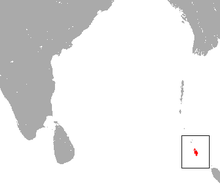The Nicobar treeshrew (Tupaia nicobarica) is a treeshrew species within the Tupaiidae.[1] It is endemic to the Nicobar Islands where it inhabits the islands' rain forests. It is threatened by habitat loss.[2]
| Nicobar treeshrew | |
|---|---|

| |
| Scientific classification | |
| Domain: | Eukaryota |
| Kingdom: | Animalia |
| Phylum: | Chordata |
| Class: | Mammalia |
| Order: | Scandentia |
| Family: | Tupaiidae |
| Genus: | Tupaia |
| Species: | T. nicobarica[1]
|
| Binomial name | |
| Tupaia nicobarica[1] (Zelebor, 1868)
| |

| |
| Nicobar treeshrew range | |
Although previously listed as an endangered species, the Nicobar treeshrew is now commonly found in its appropriate habitats.[3]
The Nicobar treeshrew was first described by Johann Zelebor in 1868.[4]
Habitat edit
The Nicobar treeshrew only occupies the Indian Islands of Great Nicobar and Little Nicobar and can be found on the highest points of these two islands, 640 m above sea level.[5]
References edit
- ^ a b Helgen, K.M. (2005). "Tupaia nicobarica". In Wilson, D.E.; Reeder, D.M. (eds.). Mammal Species of the World: A Taxonomic and Geographic Reference (3rd ed.). Johns Hopkins University Press. p. 108. ISBN 978-0-8018-8221-0. OCLC 62265494.
- ^ a b c Laginha Pinto Correia, D. & Kennerley, R. (2017) [errata version of 2016 assessment]. "Tupaia nicobarica". IUCN Red List of Threatened Species. 2016: e.T22454A115166757. Retrieved 26 January 2022.
- ^ Oommen, MA and Shanker, Kartik (2008) Ecology and Behaviour of An Endemic Treeshrew Tupaia Nicobarica Zelebor 1869 on Great Nicobar Island, India. Journal of The Bombay Natural History Society, 108 (1). pp. 55-63. ISSN 0006-6982
- ^ Zelebor, J. (1868). Cladobates Nicobaricus. In: Reise der österreichischen Fregatte Novara um die Erde. Zoologischer Theil, Band 1 Säugethiere. Wien: Kaiserliche Akademie der Wissenschaften. Pp. 17–19.
- ^ Narasimmarajan, K. 2014. Recent photographic observation of Nicobar Treeshrew Tupaia nicobarica (Zelebor, 1869) on Great Nicobar Island. Small Mammal Mail 5(2): 2-3.
External links edit
